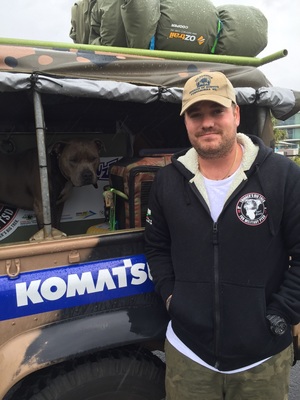AFTER more than 110 days on the road, veteran Royce Hardman and his dog Trigger have made their way to the Sunshine Coast to raise awareness of post-traumatic stress disorder (PTSD).
Royce and his American Staffy Trigger, who set off from Cairns in an ex-Army Land Rover, are roaming the country to encourage people suffering from PTSD to talk about the condition.
Royce developed PTSD after serving with the Australian Army in Afghanistan in 2009. After being discharged, Royce said he struggled with alcoholism, anger, depression, isolation and attempted suicide until he met his best mate, Trigger.
Credited with saving his life, Trigger has been by the veteran’s side ever since, and is now on the road to help Royce share his story.
Royce and Trigger started their trek in September 2015 when they walked 800km from Rockingham, Western Australia, but soon took up the ex-Army truck at the start of 2016 to continue their journey.
“The Land Rover is perfect,” Royce said. “Just like me, its 27 years old, it’s not pretty to look and it’s prone to occasional break-downs, but it’s tough and unstoppable.”
Royce and Trigger arrived in Mooloolaba on Monday 4 July and spent their time talking on the radio and appearing in local media to share the message, before hitting the road again.
Since first heading off on his once-in-a-lifetime journey, Royce has received hundreds of messages and emails of support and from people sharing their experiences with PTSD.
“I’ve been staggered by the amazing support and generosity I’ve received from all people around Australia,” he said.
“Tens of thousands of Australians and their families are affected by PTSD and they have come forward to share their stories with me, follow my journey and provide support to others who are also suffering.”
With PTSD affecting at least 10 per cent of the Australian Defence Force (ADF) personnel, Royce said it was important to encourage PTSD sufferers to seek professional counselling.
“I encourage them to share their stories on the Trigger’s Big Trek Facebook page as a way of giving hope, encouragement and support to others who are struggling to cope with PTSD,” Royce said.
Royce has received hundreds of messages from current and former ADF personnel, families of returned service personnel, widows and children of veterans who have lost their lives since returning from overseas deployment.
Royce said the messages of support and the encouragement he had received provided all the motivation he needed to continue this self-funded trek around Australia.
“ADF and the Australian Government have a moral obligation and duty of care to help these men and women recover from their wounds, whether those wounds are mental or physical, and if possible, give them an opportunity to manage their condition while continuing to serve their country,” he said.
Hardman’s Trigger for life

Digital Edition
Subscribe
Get an all ACCESS PASS to the News and your Digital Edition with an online subscription
Birding in India
Ken Cross has just returned from his sixth birding trip to India. What is it about this country that attracts Ken? He proclaims,...








